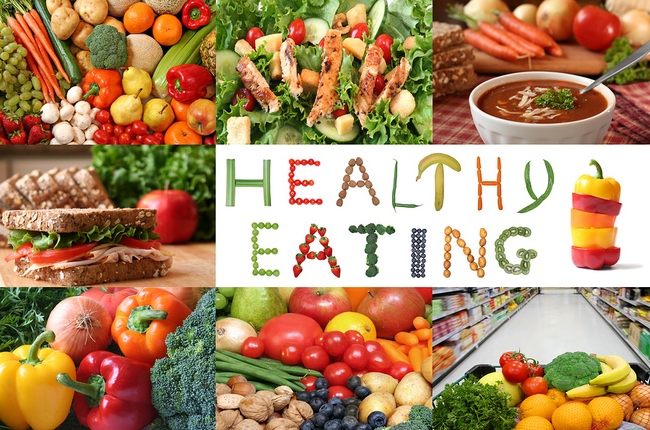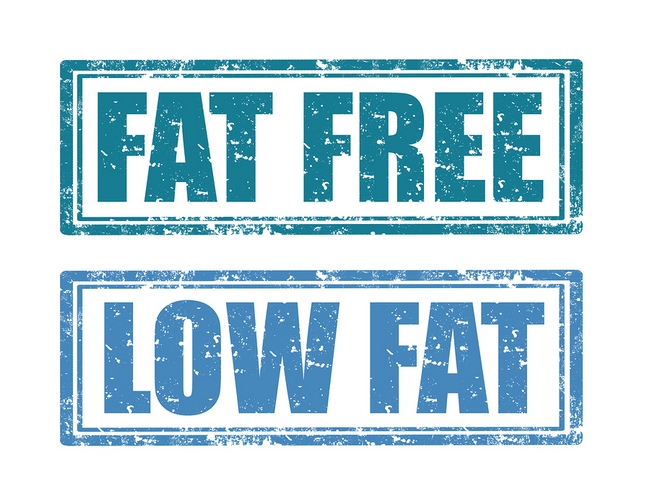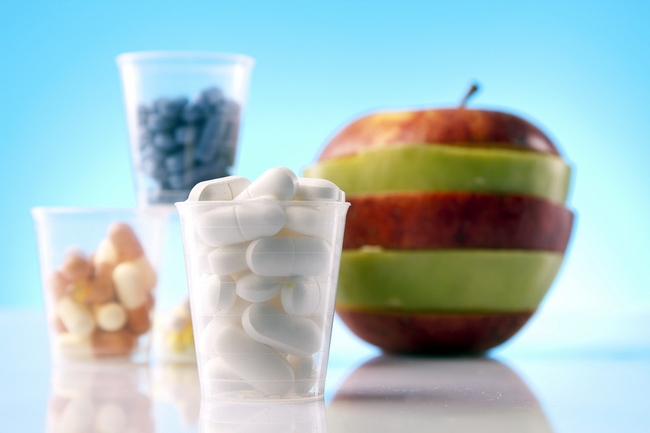- Make It Yourself Lavender Heart-Shaped Bath Bombs!
- 20 Things You Never Knew About “Down There”
- 12 Best Foods For Those Suffering From Arthritis Pain
- 12 Personal Hygiene Mistakes Almost Everyone Makes (Mom Never Told You About #4!)
- 15 Medicinal Plants And Herbs From The Cherokee People
- 12 Mind-Blowing Benefits Of Drinking Coconut Water During Pregnancy
- 12 Outstanding Winter Foods That Won’t Fatten You Up Like A Christmas Turkey
Common Sense Nutrition Facts That Aren’t Common

Photo credit: bigstock.com
As you are probably already aware, common sense is anything but common. Especially when we are talking about health and nutrition. There are all kinds of myths and misconceptions, rumors and flat out lies that abound, especially on the internet by so called health “experts” and celebrities.
What kind of things are we talking about? Keep reading. We have 21 health and nutrition facts that should be common sense but, well, aren’t so common.
1. Healthy Eating Isn’t Food Restriction
Just because you decide to eat healthy, that doesn’t mean you completely cut certain foods or groups of foods out of your diet forever. Eating is one of life’s true pleasures. What kind of life will you have if you decide that you will never, ever eat birthday cake again? Not even when your 5 year old makes one for your birthday. Really? Healthy eating shouldn’t be about restriction, but better food choices. You can make healthy pizzas, sandwiches, and even healthy lasagna. And that birthday cake? One slice on your birthday won’t kill you, but not eating it might crush your 5 year old.
2. Trans-Fats Are Your Enemy
Trans-fats are some nasty stuff. To make trans-fats you need to put vegetable oil under high pressure, heat, hydrogen gas, and a metal catalyst. This will turn that liquid vegetable oil into a sludge like compound that becomes solid at room temperature. Sounds like margarine, right? It is! You have to wonder if the person who created this stuff actually eats it. Trans-fats are unfit for human consumption, unless you are interested in heart disease and heart attacks.
3. Natural Old Fashioned Foods Are Not the Problem
One hundred years ago, more or less, heart disease was almost unheard of. The obesity problem in America came right around the late 70’s or early 80’s when the anti-fat lies began. The type 2 diabetes problem followed on the heels of obesity. These are huge problems in America and other westernized countries and it seems fairly obvious that these things have to do with our diet. For some unknown reason, health authorities are blaming these health problems on butter, eggs, and red meat. The truth is, we have been eating these foods for thousands of years, but these health problems have only arisen in the past 100 years or less. Doesn’t common sense tell you that perhaps we should be looking at the new foods in our diets, such as processed foods, processed meats, margarine, vegetable oils, and sugar?
4. The Body Does Not Need Food Every 2 or 3 Hours
Some people are confused about losing weight. They think they need to eat every two or three hours to “stoke the furnace” of their metabolism. This is a persistent myth. Studies have shown that eating more frequently has no effect on metabolism or fat burning. Eat nutritious foods when you are hungry, it’s that simple. That makes sense, doesn’t it?
Continue to Page 2

Photo credit: bigstock.com
5. Gluten Free, Organic, or Natural Does Not Equal Healthy
One of the problems with nutrition nowadays is that every new “trend” is thought to be healthy, and this isn’t true. Also, truth in labeling laws is extremely lax in this area. Foods can call themselves “organic” or “natural” and be nothing of the kind, unless you call tons of sugar and flour “natural.” Always remember that arsenic and fluoride are naturally occurring substances and no one would ever think that these are healthy! Foods that are naturally gluten free, such as oatmeal, are just fine, but the highly processed foods that replace gluten with chemicals and trans-fats are not only not healthy, they can be downright dangerous for your health.
6. Don’t Trust Mainstream Media for Your Health Information
The information that the mainstream media puts out there is one of the main problems with our health information. Every week they seem to talk about a new study that contradicts the study they just talked about last week. If you ever take the time to really read some of these studies, you will find that they tend to take them way out of context.
7. Refined Vegetable Oils are Bad News
When we are talking about refined vegetable oils we are talking about corn oil, canola oil, soybean oil, and cottonseed oil. Any oil that is extracted from seeds using high temperatures, added chemicals, and harsh processing methods. These oils are simply loaded with omega-6 fatty acids, which humans never consumed in large quantities at any time in our evolution. Refined vegetable oils cause oxidative stress and are a major contributor to heart disease. Use natural oils such as avocado oil, coconut oil, or olive oil.
8. Your Body Processes Meat Just Fine
It is absolutely untrue that meat will sit and rot in your colon and that it is the cause of colon cancer. Your body is very well equipped to digest and use all the important nutrients that are found in meat. Everything is used and there is nothing that is sitting and rotting in your large intestine. Humans have been eating meat for thousands of years with no problems. Consider the source here. Most of this kind of information comes from animal rights and vegetarian groups.
Continue to Page 3

Photo credit: bigstock.com
9. Never Trust Health Claims on Food Packages
As we touched on earlier, labeling laws are pretty lax in the US. Food manufacturers know this. They also pay attention to the trends and play on that. When Americans were looking for low fat foods, suddenly everything had a low fat label. Now, foods are being marketed as gluten free, whole grain, and GMO free. Many times, they are none of those things. For example, a recent test done by Consumer Reports found plenty of GMO corn in packages of corn chips clearly labeled GMO free. You can even find the words “whole grain” on packages of chocolate covered children’s cereal. Junk food is still junk food, no matter what kind of label you put on it. In fact, if a food has to announce in large letters that it is healthy, it probably isn’t.
10. Eggs Are Healthy
They really are! In fact, eggs are one of the most nutritious foods on the planet! Eggs were demonized starting in the 60’s when it was discovered that the yolk contains high levels of cholesterol. New studies prove, however, that eggs (or any food high in cholesterol) have any effect on blood cholesterol levels or heart disease. Almost all the nutrition in eggs (and there is a whole lot in there) can be found in the yolk, which most people avoid. Big mistake, folks! You can safely eat three or four eggs every single day so why not have some for breakfast tomorrow?
11. Junk Food is Addictive
Wow, has food ever changed over the past 100 years. Our bodies haven’t, but food sure has. We are eating more processed and junk foods than ever before. Why? Because food engineers and scientists have found ways to make their foods super rewarding to our brain centers, so we get flooded with dopamine every time we eat.
This means our brains react to junk foods the same way it would react to drugs. The more we eat, the more we want. This is the reason why many people find they can’t stop their consumption of junk foods and why regular food seems so “blah.” Many studies have shown that junk foods and drugs stimulate the same areas of the brain. Find out how to stop junk food cravings.
12. Sodas Are One of the Worst Diet Culprits
Added sugar is a nutrition disaster that no one will deny, however, getting your sugar in liquid form is the worst way you can consume it. Liquid sugars, such as those in soft drinks, do not even register with your brain as calories consumed. Therefore, you eat more calories overall. Of all the poor food choices out there, sodas must be one of the worst culprits of all. Most sodas are filled with high fructose corn syrup, which your liver can only metabolize a little at a time; therefore, most of it is simply stored as belly fat or as fat inside the liver. If you only want to make one healthy change this year, stop drinking sodas.
Continue to Page 4

Photo credit: bigstock.com
13. Fat Does Not Make You Fat
Fat has been erroneously blamed for the obesity epidemic because fat technically contains more calories per gram than either protein or carbs. But in real life situations, it’s been shown that people who eat high fat, low carb diets actually eat much fewer calories than persons on low fat, high carb diets. Fats do not make you fat, so do not jump on the low fat bandwagon!
14. Low Fat Does Not Mean Healthy
The low fat diet craze has been pushed by the mainstream media for the past 40 years and it has been a miserable failure. Americans are fatter than they have ever been before. Multiple long term studies show that it doesn’t work for the prevention of disease, nor does it work for weight loss or even for weight maintenance.
On top of this, those low fat foods that manufacturers brought to the market in hopes of cashing in on this craze tasted terrible without fat. Remember the first low fat salad dressings and mayo? Absolutely disgusting! To make these foods taste better, Big Food manufacturers added tons of sugar (which has no fat) to make things taste better.
It’s true that low fat foods such as vegetables and fruits are good for you, however, keep in mind that jelly beans have no fat either but no one would say those were healthy for you.
15. People With Diabetes Should Not Be Eating Carbs
For some unfathomable reason, people who have diabetes or hypertension have been advised to eat a low fat diet, not a low carb diet. Diabetics are insulin resistant and carbs cause huge spikes in blood sugar levels. This is why diabetics take drugs to lower their blood sugar levels. If anyone could benefit from a low carb diet, it’s diabetics. In fact, one study showed that putting diabetics on a low carb diet for only a 6 month period allowed more than 95 percent of subjects to reduce or eliminate their diabetes drugs.
16. Fruit Juice is Not Very Different from Sodas
Too many people believe that drinking fruit juice is much better for you than sodas. After all, isn’t fruit healthy and natural? Well, that much is true, but fruit juice contains just about as much sugar as sodas. There is no fiber to fill you up and no chewing resistance telling your body that you are eating something. Liquid calories do not register in the brain, as we mentioned before. Small amounts of fruit juice are fine if you enjoy them, however, gulping down fruit juice all day in place of water is really no different than chugging a Coke.
Continue to Page 5

Photo credit: bigstock.com
17. Calories Count, but You Don’t Need to Do It
Of course calories matter. Being overweight is a matter of eating more than energy (calories) than your body burns. This doesn’t mean, however, that you have to count every single calorie that enters your mouth. Simply eating more protein and fewer carbs will automatically result in a restriction of calories and natural weight loss. Try counting carbs instead of calories and watch the weight fall off like magic.
18. Feeding Your Gut is Vital
Did you know that the bacteria in your intestines, sometimes called your gut flora, outnumber your human cells 10 to 1? Numerous research studies over the past 10 years have shown that the numbers and types of these bacteria can have extreme implications for your health. Your gut flora can have an impact on everything from your brain function to your body weight to your immune system function. Those bacteria need to eat, just like everything else in this world, and their preferred food is soluble fiber. Be sure to eat plenty of fiber and probiotic foods to keep those little guys in your gut happy and healthy.
19. Being Healthy Isn’t All About Your Weight
Most people focus way too much on their weight. Being healthy involves so much more than just how much or how little you weigh. There are obese people who are metabolically healthy, while there are people with normal body weights that have metabolic problems that are generally associated with being overweight.
Becoming obsessed with body weight is counterproductive. It would be better to focus on eating a plant based, organic diet, getting plenty of natural sunshine, removing stress from your life as much as possible, sleeping a minimum of 7 hours each night, and getting in some exercise rather than focusing on that number on the scale.
Continue to Page 6

Photo credit: bigstock.com
20. Weight Loss Supplements Don’t Work
Speaking of weight, don’t waste money on those over the counter weight loss supplements, including the pink ones that are currently making the rounds on Facebook and other internet sites. They don’t work. If they should work, it will only be temporary and the weight will be back in a matter of weeks. Study after numerous study show that these supplements do not work.
In fact, the people promoting these “magic” pills or drinks are doing the public more harm than good by encouraging people to look for an easy fix, rather to focus on their diet and lifestyle habits, the only known methods of losing weight that really work.
SEE ALSO: 15 Foods Nutritionists Refuse to Eat but You Probably Eat Every Day
21. Cholesterol is NOT Your Enemy
When people are talking about cholesterol, they generally are referring to the “good” cholesterol or the “bad” cholesterol. What they are really talking about are the proteins that carry cholesterol through the body.
Low Density Lipoprotein is the LDL or “bad” cholesterol and High Density Lipoprotein is referred to simply as HDL or the “good” cholesterol.
Cholesterol itself is not your enemy. In fact, your liver actually makes some of the cholesterol you have in your body right now. Foods that contain cholesterol do not translate into higher blood cholesterol levels. So it’s not so much the foods you are eating that is raising your cholesterol levels, but the lipoproteins that are carrying that cholesterol through your blood.
References:
































